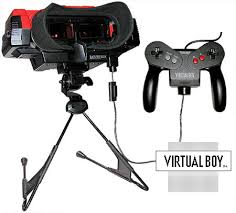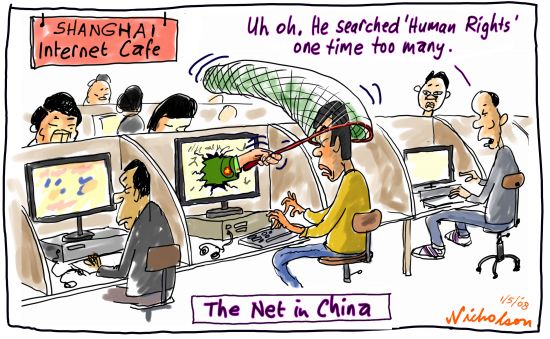 |
| I'm pretty sure the new console from Nintendo will not look like this. |
An amazing amount of info is now bubbling forth about the new console (the Wii 2? Wii HD? probably some new name entirely) from Nintendo. A suspicious sort of person might wonder if all this isn't appearing with the tacit or even explicit permission of Nintendo, while preserving their complete deniability. It's an old game in the tech business, and it's played masterfully in the gaming business. The combination of numerous press outlets (web sites, these days), and a huge fan base of die-hard gamers make rumors about new games and especially new gaming hardware irresistible. It's an especially convenient way for a company to generate a lot of press, and see what sort of reception proposed products generate, before actually going on the record as planning to produce something.
Big game developers are very good about keeping to their non-disclosure agreements, and generally don't leak very much info at all. If they were to let slip with some info, you can bet Nintendo (or Sony or Microsoft) would punish them... and when you have a chance to ship a launch title for a new platform, which could be an easy path to a million-plus unit seller, you don't want to mess that up. Hence, very little info about new hardware leaks out. Unless the company who created the hardware wants the info leaked... which is when you start seeing the rumors.
In this case, with rumors from multiple sources, it's pretty clear to me that this was orchestrated by Nintendo. It's not a coincidence it comes on the heels of a flawed 3DS launch; this is an excellent way for Nintendo to change the conversation and get some positive buzz before E3. Certainly they've been working on new hardware for years, but probably got serious last year as Wii sales started heading south. Now it's clearly time, or maybe a little past time, to get a new console out there for Nintendo.
What are some of the specifics about the Wii 2? Glad you asked, because I've scoured the web for some data. The Wii 2 will certainly try for feeds and speeds superior to the Xbox 360 and the PS3, though of course there will be plenty of argument about who's fastest at a particular task. The Wii 2
should sport a PowerPC CPU with at least 3 cores, probably a higher clock speed than current consoles, an ATI GPU from the R700 line (one of their latest and greatest). and 512 MB of RAM. The CPU and GPU are probably custom-modified for Nintendo, as has been their practice in the past, to optimize certain functions Nintendo deems important.
The controllers will apparently be a key part of Nintendo's strategy, as they try to innovate here to set themselves apart from other consoles. There will be a 6 inch HD touchscreen on the controller, and the controller will function as a Wii sensor bar for backwards compatibility. The controller will also have a camera, a D-pad, 2 bumpers, 2 triggers... and possibly other functions as well (a microphone is cheap, as are some sensors for orientation... rumble capability, too, I bet). The screen may have touch control, and you could have the ability to stream games to the controller. It's supposed to have better motion control sensing than the Move.
It makes sense to beef up the controller functions, as this is an area where there hasn't been much work for a long time. Certainly the DS design showed the utility of having a second, touch-capable screen handy in game designs. Even handier when you can get information that is kept secret from other players; useful for play-picking in sports games, of course, but there will be other uses, too.
Developers have had units for months, according to the rumors, so these features look to be pretty solid. Of course, Nintendo can feel free to change any or all of these specs since they have not officially said anything yet. I'd expect some changes from these specs before product actually ships. When will that be? It's barely possible they could ship by Christmas, but it seems to be rushing it if they expect to have some really good software available at launch. Perhaps a Japanese launch at Christmas, and then the USA/Europe in springtime might be doable. That's my speculation, but of course actual manufacturing , design schedules and software will affect the timing. Price? This sounds like it will be fairly expensive to me; I wouldn't be too startled to see $499, though $399 is more likely. If Nintendo really wanted to give Microsoft and Sony fits, they'd roll out at $299, but I doubt that will happen.
Speaking of price, the Wii
price drop hits a little earlier than expected; major stores like Target and Toys R Us now have the Wii at $169.99. Nintendo has finally joined us in reality, and decided to lower the price of the Wii; the
rumor mill says the price will fall to $149.99 in mid-May, in an effort to make E3 even more shiny for Nintendo.
Now we'll have to wait and see how Microsoft and Sony respond. They would really love to avoid putting out a new console, having gotten the current generation to a nice profitability. I expect them to react by cutting prices prior to the holiday season, and perhaps bundling software, and maybe getting more aggressive on pricing for their motion-control hardware Kinect and Move (and the bundles including them). They won't put out a new console until Nintendo really forces their hand. A lot can happen before Nintendo actually gets a new console on the market and it starts taking measurable market share from Sony or Microsoft. Why react too fast? Wait a while to see how things shake out, and meanwhile have the engineers working on new hardware for when you really need to introduce it. Perhaps announce in 2012, and ship in 2013... or 2014... that would be better for Sony or Microsoft. But Nintendo will be trying like hell to force their hands.
It will be an interesting E3...





























